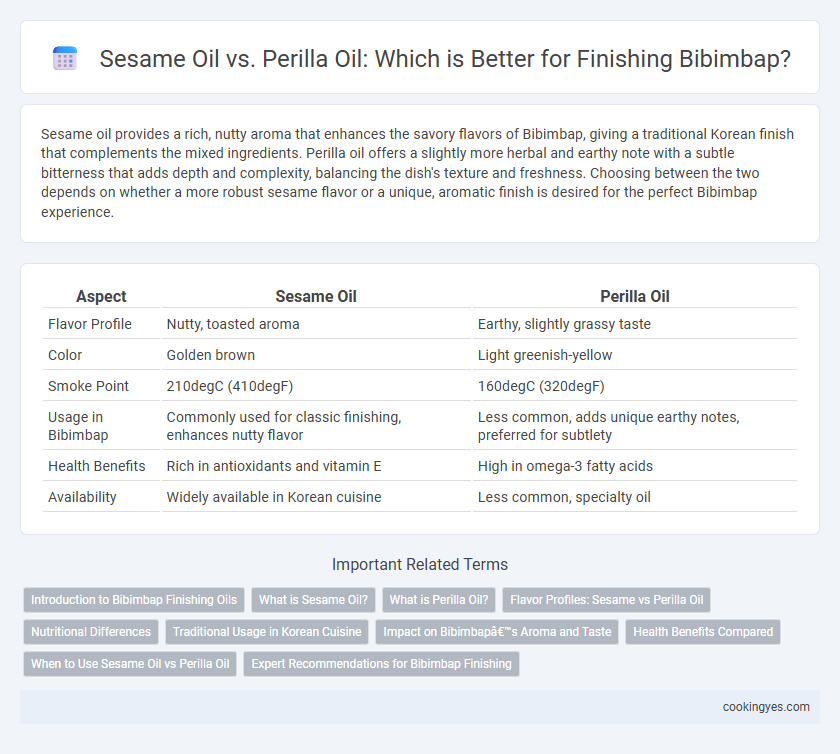Sesame oil provides a rich, nutty aroma that enhances the savory flavors of Bibimbap, giving a traditional Korean finish that complements the mixed ingredients. Perilla oil offers a slightly more herbal and earthy note with a subtle bitterness that adds depth and complexity, balancing the dish's texture and freshness. Choosing between the two depends on whether a more robust sesame flavor or a unique, aromatic finish is desired for the perfect Bibimbap experience.
Table of Comparison
| Aspect | Sesame Oil | Perilla Oil |
|---|---|---|
| Flavor Profile | Nutty, toasted aroma | Earthy, slightly grassy taste |
| Color | Golden brown | Light greenish-yellow |
| Smoke Point | 210degC (410degF) | 160degC (320degF) |
| Usage in Bibimbap | Commonly used for classic finishing, enhances nutty flavor | Less common, adds unique earthy notes, preferred for subtlety |
| Health Benefits | Rich in antioxidants and vitamin E | High in omega-3 fatty acids |
| Availability | Widely available in Korean cuisine | Less common, specialty oil |
Introduction to Bibimbap Finishing Oils
Sesame oil is the traditional finishing oil for bibimbap, prized for its nutty aroma and rich flavor that enhances the dish's harmonious blend of vegetables, rice, and gochujang. Perilla oil, extracted from perilla seeds, offers a unique, slightly grassy and earthy taste with higher levels of omega-3 fatty acids, appealing to health-conscious diners seeking a subtle alternative. Choosing between sesame oil and perilla oil impacts the final flavor profile, aroma, and nutritional value of bibimbap, making the finishing oil a crucial element in authentic preparation.
What is Sesame Oil?
Sesame oil, extracted from roasted sesame seeds, is a key ingredient in Korean cuisine, known for its rich, nutty flavor and aromatic quality that enhances the taste of bibimbap. It contains antioxidants and healthy fats like linoleic acid, contributing to its health benefits and ability to balance spiciness and saltiness in dishes. Sesame oil's deep brown color and distinct taste make it ideal for drizzling over bibimbap as a finishing oil, adding depth and a toasty aroma.
What is Perilla Oil?
Perilla oil, extracted from the seeds of the Perilla frutescens plant, offers a nutty and slightly grassy flavor that enhances the depth of Bibimbap. Rich in alpha-linolenic acid (ALA), a plant-based omega-3 fatty acid, perilla oil provides health benefits such as anti-inflammatory properties and improved heart health. Unlike sesame oil, perilla oil has a lighter taste and aroma, making it a subtle finishing oil that complements the diverse ingredients in Bibimbap without overpowering them.
Flavor Profiles: Sesame vs Perilla Oil
Sesame oil offers a rich, nutty flavor with toasted undertones that enhance Bibimbap's savory and umami notes, creating a well-rounded and aromatic finish. Perilla oil, by contrast, provides a more herbaceous and slightly minty taste, introducing a fresh and unique dimension to the dish. Choosing between sesame and perilla oil significantly impacts the final flavor profile, with sesame delivering warmth and depth, while perilla adds brightness and complexity.
Nutritional Differences
Sesame oil is rich in antioxidants like sesamol and vitamin E, which promote heart health and reduce inflammation. Perilla oil contains high levels of alpha-linolenic acid (ALA), an omega-3 fatty acid known for supporting brain function and lowering cholesterol. Both oils enhance Bibimbap's flavor while offering distinct nutritional benefits--sesame oil focuses on antioxidant properties, whereas perilla oil is valued for its omega-3 content.
Traditional Usage in Korean Cuisine
Sesame oil and perilla oil each hold distinct traditional roles in Korean cuisine, particularly in finishing dishes like Bibimbap. Sesame oil is prized for its rich, nutty aroma and is commonly drizzled to enhance the savory depth of the dish, complementing the seasoned vegetables and gochujang. Perilla oil, with its unique, slightly herbal flavor, is traditionally used in certain regional variations of Bibimbap, adding a subtle complexity while maintaining the dish's authentic Korean essence.
Impact on Bibimbap’s Aroma and Taste
Sesame oil enhances Bibimbap's aroma with its rich, nutty fragrance and imparts a deep, roasted flavor that complements the dish's diverse ingredients. Perilla oil offers a more herbaceous and slightly earthy aroma, adding a unique, fresh complexity to the taste profile. The choice between sesame oil and perilla oil significantly influences Bibimbap's sensory experience, balancing traditional richness against a lighter, aromatic nuance.
Health Benefits Compared
Sesame oil and perilla oil offer distinctive health benefits when used to finish bibimbap. Sesame oil contains high levels of antioxidants and sesamin, which support heart health and reduce inflammation. Perilla oil is rich in omega-3 fatty acids, particularly alpha-linolenic acid (ALA), promoting brain health and lowering cholesterol.
When to Use Sesame Oil vs Perilla Oil
Sesame oil is best used for finishing Bibimbap when a rich, nutty aroma and deep toasted flavor are desired, enhancing the dish's overall warmth. Perilla oil is ideal for adding a fresh, slightly grassy note with a subtle herbaceous quality, perfect for lighter, more delicate variations of Bibimbap. Choosing between sesame and perilla oil depends on the flavor intensity and aroma profile intended for the final presentation.
Expert Recommendations for Bibimbap Finishing
Experts recommend sesame oil for finishing Bibimbap due to its rich, nutty flavor and aromatic qualities that enhance the dish's authenticity. Perilla oil, while also used, offers a more herbaceous and slightly minty taste that some chefs prefer for a unique twist in regional variations. The choice between sesame and perilla oil ultimately depends on the desired flavor profile, with sesame oil favored for traditional Bibimbap finishing by culinary professionals.
Sesame oil vs Perilla oil for finishing Infographic

 cookingyes.com
cookingyes.com